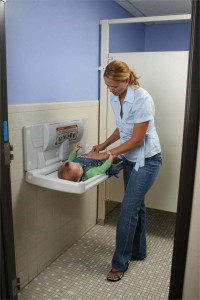Norovirus is incredibly infectious. The particles can aerosolize, infecting anyone who, for example, cleans up norovirus-containing barf. The virus is sturdy, and stays viable for months on a variety of surfaces.
So when the call came in, Washington County health authorities figured this was  a typical norovirus outbreak caused by contaminated food.
a typical norovirus outbreak caused by contaminated food.
Lynne Terry writes in The Oregonian that all of the people at the Hillsboro auto dealership who became ill ate take-out submarine sandwiches, served buffet-style, on the same day.
But what food safety sleuths uncovered was quite a different story, one that comes with a warning about baby changing stations.
The outbreak was reported this month in the Journal of Infectious Diseases but dates to May last year when the dealership held a staff meeting in the showroom at lunchtime.
All 16 employees working that day attended and all but two ate a submarine sandwich off a platter.
Within 30 hours, 12 employees started getting sick.
The dealership, which Washington County did not name, suspected the fast-food restaurant was to blame. So did Washington County food safety specialists.
“Any sort of buffet food is high-risk,” said Kimberly Repp, epidemiologist at Washington County. “We figured it was that.”
Plus, the food came from a take-out restaurant with historically a poor inspection record, according to Washington County officials.
The auto dealership called the restaurant about the outbreak and also informed the county, which sent an environmental health inspector. The inspector found two code violations at the restaurant, but neither explained the outbreak.
The inspector also asked about staff illnesses.
“The typical scenario would be a food handler working while sick,” said William Keene, senior epidemiologist with Oregon Public Health. “That could have been the end of the investigation.”
Only one restaurant employee had been ill in the two weeks before the outbreak, but that person suffered a severe headache, not gastrointestinal symptoms  associated with norovirus. No customers had complained of being ill, either.
associated with norovirus. No customers had complained of being ill, either.
Repp discovered that something else was to blame. During interviews with employees, one recalled that a customer with a sick child had used the diaper-changing station in the women’s restroom before the lunch. When the woman and toddler left, the restroom was a mess.
The employee cleaned it up as best she could with dry paper towels. She didn’t wear gloves or use bleach but did wash her hands. She left the restroom, opened the dealership’s front door for another employee carrying the food and was the first to take a sandwich from the platter.
All five of the women who worked at the dealership that day reported using the women’s restroom. They all got sick, as did seven of 11 male employees.
Repp figured the contamination started at the diaper-changing station, and then the virus was spread outside the restroom. To be sure, she swabbed the surface of the unit and had it tested. Results showed it was contaminated with norovirus. Tests also turned up the same strain in the toddler and two of the sick employees.
The outbreak investigation marked the first anywhere to trace norovirus to a diaper changing station, Repp said.
That connection warranted publication of the investigation in the journal. But another observation stunned Repp even more.
Two weeks after the outbreak, she returned to the dealership. Staff said the unit had been cleaned by professional janitors twice since then. But Repp could see fecal material on the surface.
She decided to dig deeper, visiting 14 other public restrooms in Washington County, in parks, a restaurant, grocery stores, gas station, libraries, shopping malls and an aquatic center. None turned up norovirus, the only lab test she ran. But eight were visibly soiled.
“I was horrified,” Repp said. “None of these stations are cleaned.”
There are no Oregon regulations on sanitizing diaper-changing stations.
Even when cleaned, baby changing stations might not be sanitized. Common disinfectants kill many bacteria but are not effective against norovirus. The virus is extremely hardy and can live for days — if not weeks — in the environment. Only a few organisms can make someone ill.
A solution of bleach or hydrogen peroxide is believed to be the one way to kill the virus. But the manufacturer of the baby station at the car dealership does not recommend bleach because it could damage the plastic.
Repp said the best practical precaution is for parents not to put their children directly on the surface. She advised them to carry their disposable liners or plastic to change diapers at a station.
